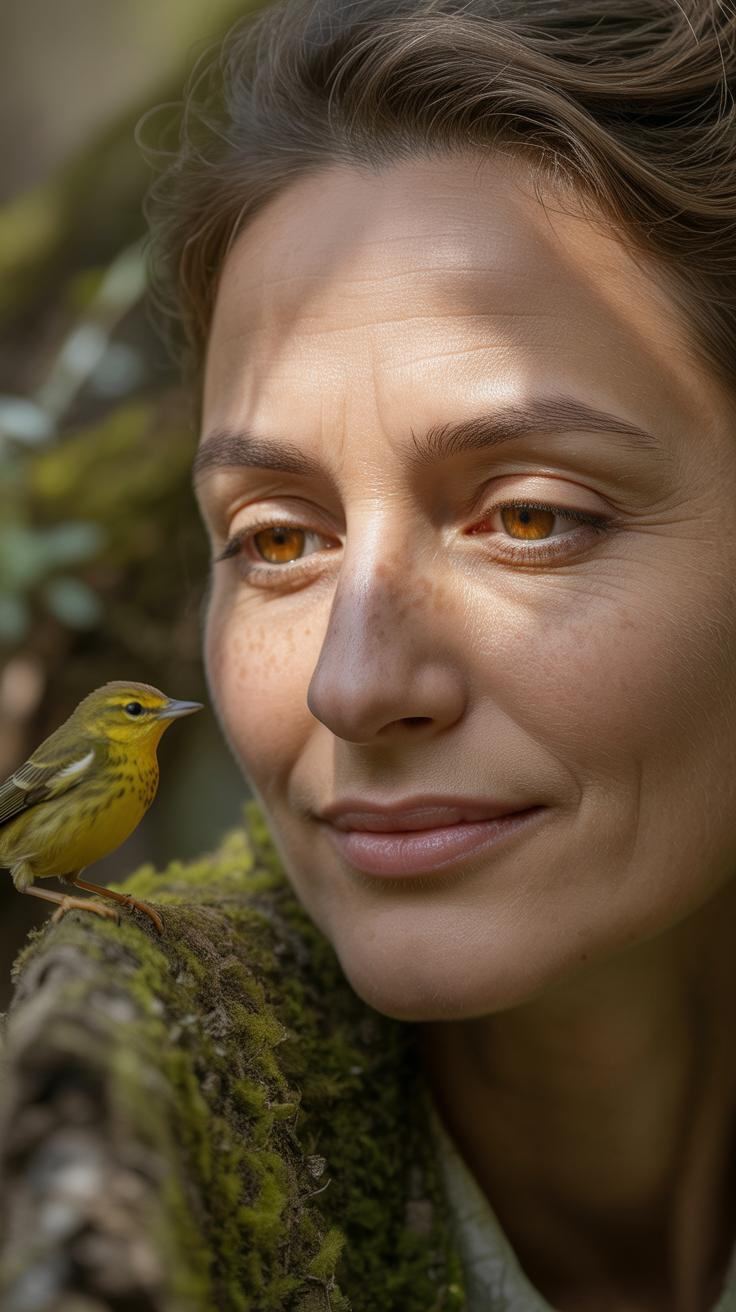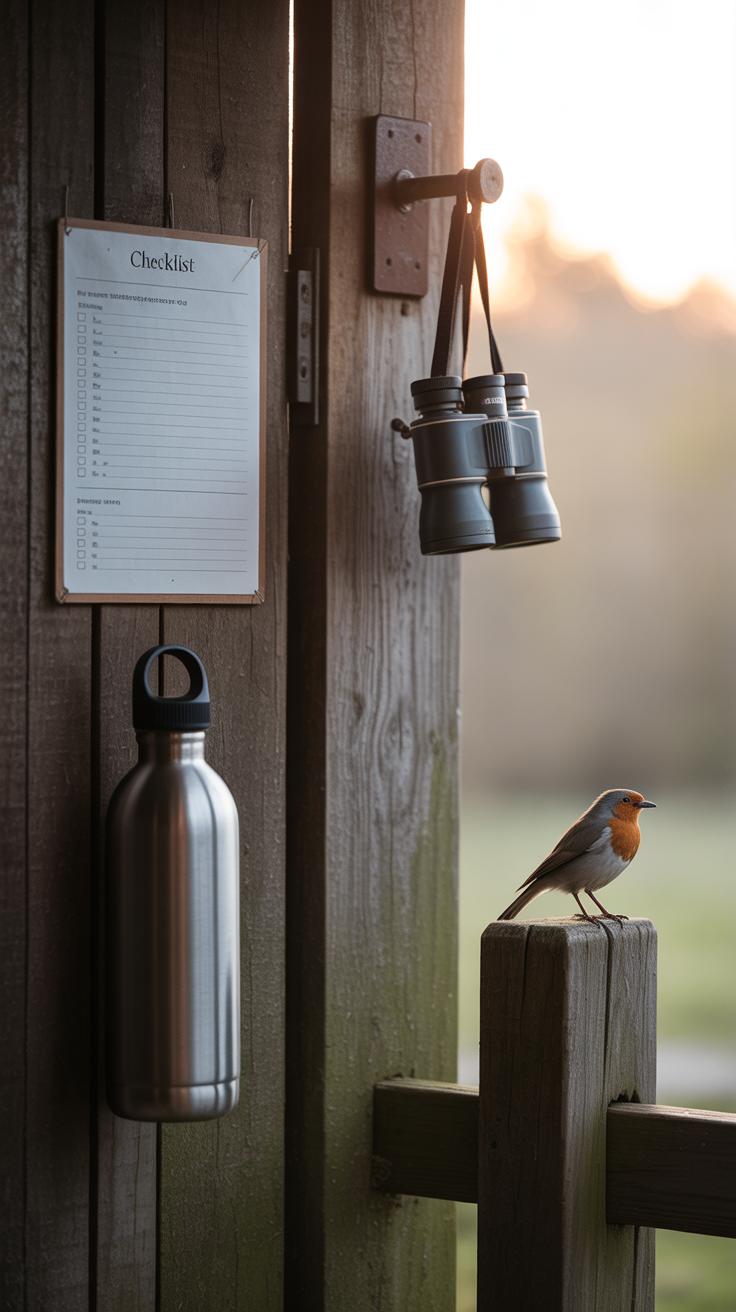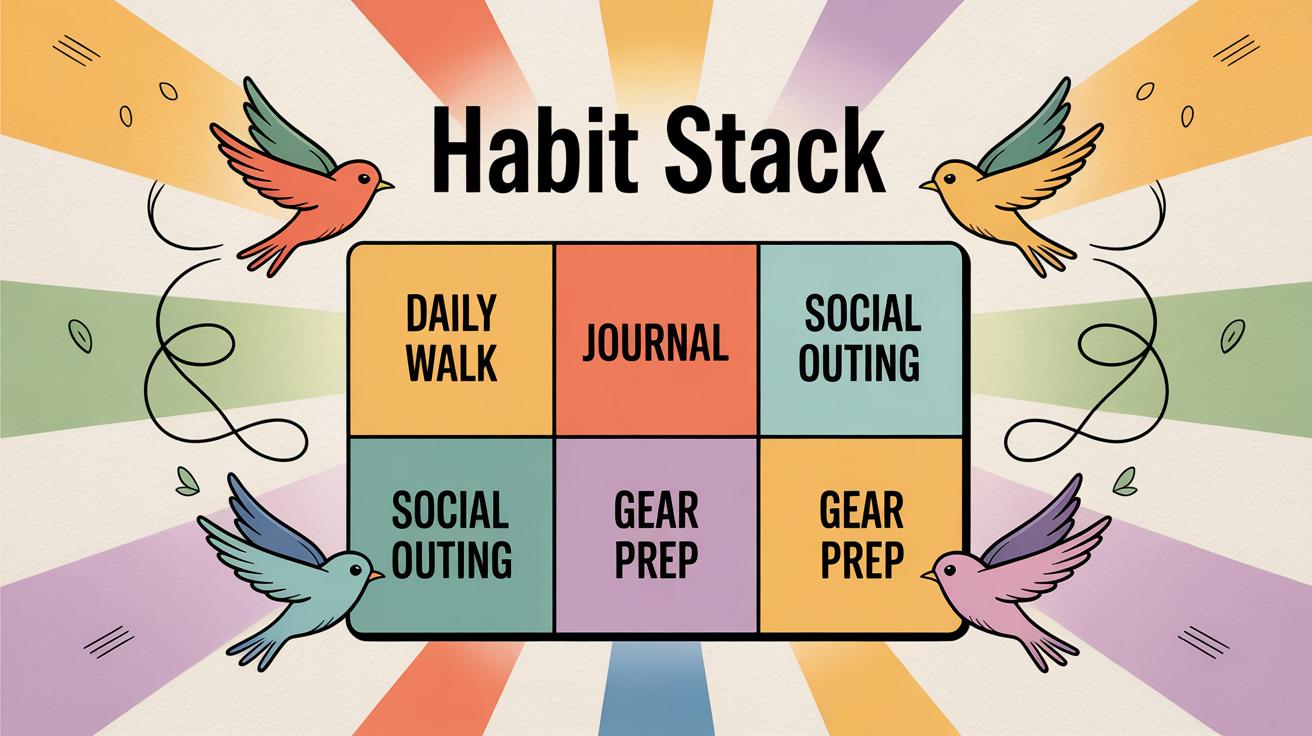Introduction
Mental wellbeing is a key part of overall health. One simple activity you can do in the morning can help improve your mood and mental state throughout the day. Taking a morning bird walk combines two strong factors: walking and bird watching. Both of these activities have been linked to better mental health and lower stress.
This article will explore how a morning bird walk can lift your mental wellbeing. You’ll learn why walking helps your brain, how watching birds connects you with nature, and practical tips to make this part of your daily routine. By understanding these benefits, you can feel motivated to start your mornings in a positive and peaceful way.
Why Walking Each Morning Helps Your Mental Health
Walking every morning can do quite a bit for your mental wellbeing. When you make it a habit, you might notice stress seeming a little lighter. That tense feeling in your shoulders might ease off, just from moving around outside. It’s not just about exercise; it’s also how walking triggers your brain to feel better.
Here’s what usually happens:
- You feel calmer after a walk because your body slows down its stress signals.
- Your mood can lift, making your day feel less heavy.
- Your focus sharpens, helping you concentrate on tasks afterward.
For example, someone I know always starts work better after a short morning walk. When distracted by worries, that bit of movement outdoors helps clear the fog.
How Walking Impacts Your Brain Chemistry
Walking causes your brain to release chemicals that affect how you feel. Think of endorphins and serotonin as little helpers. They pop up during movement and make you feel happier or less tense.
Here’s a simple way to see it: after a walk, you might feel more relaxed or cheerful without even realizing why. That’s endorphins and serotonin at work. They brighten your mood and reduce discomfort.
This happens because walking increases blood flow and sets your brain cells buzzing, helping those mood chemicals travel around. It’s like your brain’s natural way of saying, “Good job!”
Walking as a Tool to Clear Your Mind
Sometimes, your mind feels crowded with worries or distracting thoughts. Walking can help with that by giving your brain space to breathe.
Imagine you’re stuck on a problem or feeling overwhelmed. Taking a walk may quiet those endless thoughts, letting you think more clearly afterward.
I remember one morning feeling a bit lost about what to do next. A walk helped break the loop of negative thoughts, and suddenly ideas were easier to come by. It’s like walking gently pushes those thoughts aside, making room for fresh ones.
So, walking isn’t just about your body moving. It’s about giving your mind a break. And that can feel surprisingly refreshing.
The Role of Nature in Mental Wellbeing
Spending time outdoors, especially in natural settings, can influence your mental health in ways that are sometimes hard to pin down. You might not notice the change straight away, but after a few moments amid trees, birds, or open skies, something shifts. Maybe it’s subtle—a lightness in your thoughts or a drop in tension. Nature’s impact on the mind often comes from several small, interconnected factors.
Exposure to morning sunlight plays a key role. That early light isn’t just pleasant, it directs your body’s internal clock, setting routines for wakefulness and rest. Your brain boosts serotonin production, which helps stabilize mood, often keeping feelings of irritability or gloom at bay. If you’re like me, a patch of sunlight on your face can almost feel like a gentle nudge awake, rather than a harsh alarm. It’s less about intensity and more about timing.
Meanwhile, fresh air can clear mental fog. There’s something about natural, clean air that helps reset your focus and calm your nerves. Unlike the stale, recycled air indoors, outdoor air seems to open up your headspace, making it easier to think and less likely to feel overwhelmed. You might find your breathing slows without effort, and for a moment, your mind feels lighter.
Natural scenery, though not the focus here, contributes quietly—offering variety and grounding your senses without demanding too much attention. Think of those moments when the sky’s color shifts or leaves move gently in a breeze; they do more than decorate the background. They invite your mind to relax and observe without pressure.
So, when you combine morning sunlight and fresh air, it creates conditions that can gently steer your mood toward steadiness and clarity. You might not notice it as a dramatic change, but over time, these small effects add up—helping you feel a bit more balanced. Isn’t it interesting how the simplest elements of nature influence your inner world?
How Bird Watching Engages Your Mind and Emotions
Watching birds isn’t just about spotting a rare species or ticking off a list—it pulls your attention in a way that few activities do. When you look for birds, you engage your mind actively, scanning the environment, tuning into little movements or calls. That focus is kind of different from the usual scatter of thoughts running through your head. It sparks curiosity too—you might find yourself wondering about a bird’s behavior, its song variations, or why it prefers certain spots.
There’s also this quiet connection with a living creature. Observing birds makes you feel part of something outside just your daily routines. That interaction, subtle as it is, shifts your mental state. It gently nudges you away from stress or boredom toward something more attentive and alive. At least, that’s how I’ve experienced it on unplanned mornings when the birds just seem to invite you in.
The Joy of Observing Bird Behaviors
Birds don’t just sit still—they move, hop, preen, and sing in ways that are unexpectedly absorbing. Watching those tiny movements commands your attention and makes distractions fade, if only for a little. It’s like the brain clicks into “watch mode,” and suddenly, your worries lose their grip.
There’s something simple but joyful about hearing a bird song or seeing a quick flight. Those moments can bring a quiet smile or surprise, reminding you how small but lively this world actually is. Sometimes, it’s the unpredictability of what the bird might do next that keeps you hooked. Even if that happiness feels fleeting, it has a way of settling in, softly lifting your mood.
Bird Watching as Mindful Practice
Bird watching pulls you into the here and now. You can’t really half-watch birds. Your senses have to be alert, your thoughts tethered to the moment—listening, watching, waiting. This natural focus has a calming effect, similar to meditation, but without the pressure to “clear your mind.”
When you’re out there, noticing feathers, colors, and chirps, your brain isn’t off replaying mistakes or worrying about the day ahead. It’s present. This can ease stress, slow down rapid thoughts, and give your mind a gentle reset. Maybe the next time you feel overwhelmed, stepping outside to watch birds will offer a pause that feels surprisingly refreshing.
Creating Your Own Morning Bird Walk Routine
What You Need to Get Started
Starting a morning bird walk doesn’t require much gear, but a few simple items can make the experience more enjoyable. Comfortable shoes are a must—you’ll want to move easily without worrying about blisters or sore feet. A small pair of binoculars can help you spot birds without getting too close and disturbing them, though you can definitely practice just watching with your eyes.
A notebook or journal might seem old-fashioned, but jotting down your observations or thoughts can deepen the connection with nature and track your progress. Sometimes, the act of writing how a bird looked or behaved helps harder-to-spot details stick in mind. In cooler months, a light jacket and maybe a hat for sun or dew can keep you comfortable. But really, don’t feel pressured to have everything perfect before you go out—sometimes just being outside is enough.
Choosing Times and Places for Walking and Bird Watching
Early mornings are often the best time to catch birds at their most active, usually just after sunrise. That said, depending on where you live, times might shift a bit—some birds are livelier at dusk or mid-morning. Parks, nature reserves, or even quiet neighborhood streets can host surprising bird activity. If you’re near water, areas around ponds or streams often attract a mix of species.
Don’t be afraid to try different spots to find what feels comfortable and stimulating for you. Some people prefer wooded trails where birds hide in branches, while others enjoy open grassy fields where you can watch them flit across the sky. It might take a few mornings, but you’ll begin to notice which places and times hold your interest most. And maybe you’ll find that your favorite route changes over time, which is part of the charm.
Stories from People Who Improved Mental Health with Bird Walks
How Mary’s Mood Improved with Daily Bird Walks
Mary struggled with anxiety for years. She found it hard to start her days without feeling a knot in her stomach. Then, she began stepping outside for short morning bird walks. At first, it was just a way to get fresh air, but gradually, something shifted.
Listening to birds’ calls and watching their movements seemed to pull her mind away from worries, even if only for a few minutes. She said it felt like her thoughts slowed down, becoming less tangled. Some mornings, Mary noticed she was smiling more, or feeling calmer without really understanding why.
Her mood lifted bit by bit, not suddenly, but steadily. It wasn’t a magic cure—she still had anxious days—but those walks became something she looked forward to, a space where she could be present instead of overwhelmed. That small change helped her feel happier overall.
John’s Experience with Focus and Calm
John found it tough to concentrate at work. His mind would scatter, jumping between tasks, and stress grew as deadlines loomed. One morning, a friend suggested bird watching as a way to slow down. Skeptical at first, John tried a short walk before starting his day.
Surprisingly, paying attention to birds forced him to focus—watching their feathers, noticing patterns, identifying sounds. It was a quiet challenge that pulled his attention away from stress. He realized he could carry that calm with him through the day.
John says it’s like training his brain. The bird walks don’t erase stress, but they create moments of calm. Sometimes, when the work feels intense, he thinks back to those quiet walks, which helps reduce overwhelm. It changed how he reacts to pressure, even if only a little.
Other Activities to Boost Mental Wellbeing in the Morning
If morning bird walks have become a part of your routine, you might wonder what else can gently support your mental wellbeing at the start of the day. Sometimes, adding just a few simple habits can shift your mindset in subtle but meaningful ways. For example, think about breathing exercises and stretching—they’re easy to do, don’t require special equipment, and can leave you feeling calmer before or after your walk.
Breathing Exercises and Stretching
Try this: take a slow, deep breath in for four counts, hold it briefly, then breathe out slowly for six. Repeat this a few times. It’s surprisingly effective at easing tension. You can pair that with gentle stretches—reach up, lean side to side, roll your shoulders. These movements wake your muscles while signaling your brain to relax. Sometimes I skip this step, but when I don’t, I notice I carry less stiffness through the day. Even five minutes can matter.
Mindful Journaling
Journaling after your walk offers another way to ground your thoughts. Writing about the birds you saw, the sounds you heard, or how you felt helps lock in positive feelings. You don’t need to craft perfect sentences—just a few notes or sentences about your mood can work wonders. It’s a moment to reflect and sort through any lingering worries. Maybe you find your mind wanders to unrelated things, which is okay. The simple act of pausing and writing often nudges your mindset toward calmness and intention.
Scientific Insights on Walking Nature and Mental Health
Key Research on Walking and Brain Health
Walking does more than just get you from point A to B. Studies show that even moderate walking improves blood flow to the brain, which can help with memory and thinking skills. One research project found that people who walked regularly had increased hippocampus volume—the brain area linked to memory. That surprised me a bit because it suggests walking might actually change your brain structure. But, it’s not just about physical changes; walking can lift mood and reduce anxiety, probably by triggering brain chemicals like serotonin and dopamine.
Still, the intensity or length of a walk isn’t always critical. Short, frequent walks can do the trick. So, even a 20-minute stroll might be enough to notice mental shifts. It makes you wonder—how much do we underestimate simple exercise’s power on our minds?
Studies on Nature’s Role in Reducing Stress
Spending time in natural settings isn’t just calming—it alters your body’s stress responses. Research has documented lower cortisol levels after just a brief period amongst trees or near water. It feels almost… instinctual. Maybe that’s why many people report feeling lighter or more peaceful after time outdoors.
Bird watching adds a layer to this experience. Tracking birds requires focus but also invites quiet observation. This mix of attention and calm seems to give the mind a break from everyday worries. One study had participants sit quietly in a park watching birds for 15 minutes—afterwards, their mood improved measurably. It’s a reminder that it’s not only the environment but how you engage with it.
That said, not everyone reacts the same way. For some, crowded or noisy nature spots might be more stressful than helpful. So, finding a spot that feels right to you could matter just as much as being outdoors itself.
Maintaining LongTerm Mental Wellbeing with Daily Habits
Keeping your morning bird walk going over weeks, months, or even years isn’t always straightforward. Life shifts, schedules get hectic, and motivation can dip. That said, small, realistic goals can make a big difference. Rather than aiming to spot a dozen bird species each morning, maybe start with just five minutes outside or a simple stretch before you walk.
Reminders can help too—set an alarm, leave your binoculars visible, or jot down what you noticed on your walk the day before. These little nudges create a gentle push without pressure. I’ve found that sometimes, even the smallest success feels enough to keep me going.
When circumstances change—rainy days, work deadlines, or travel—you might need to tweak the habit instead of dropping it. Maybe swap your walk for a brisk indoor stretch with bird sounds on a speaker. Or shift the walk to later in the day if mornings don’t work. Flexibility can feel like giving up, but it’s really about keeping the connection alive despite obstacles.
Ask yourself what part of the habit gives you the most satisfaction—is it the quiet, the movement, the focus on nature? Hold on to that core if the rest needs to bend. After all, sustaining mental wellbeing isn’t about perfection; it’s about persistence in a way that fits your life.
Conclusions
A morning bird walk offers many benefits for your mental wellbeing. Walking helps your body release chemicals that improve mood and concentration. Watching birds helps you feel calm and connected to the world around you. Together, these activities give you a peaceful start to your day while supporting your mental health.
Incorporating a morning bird walk into your routine is simple and accessible. Just step outside, move at a comfortable pace, and observe the birds you see and hear. Over time, this habit can help you feel more relaxed, focused, and happier. Your mental wellbeing will rise as you enjoy quiet moments with nature and gentle exercise.





















